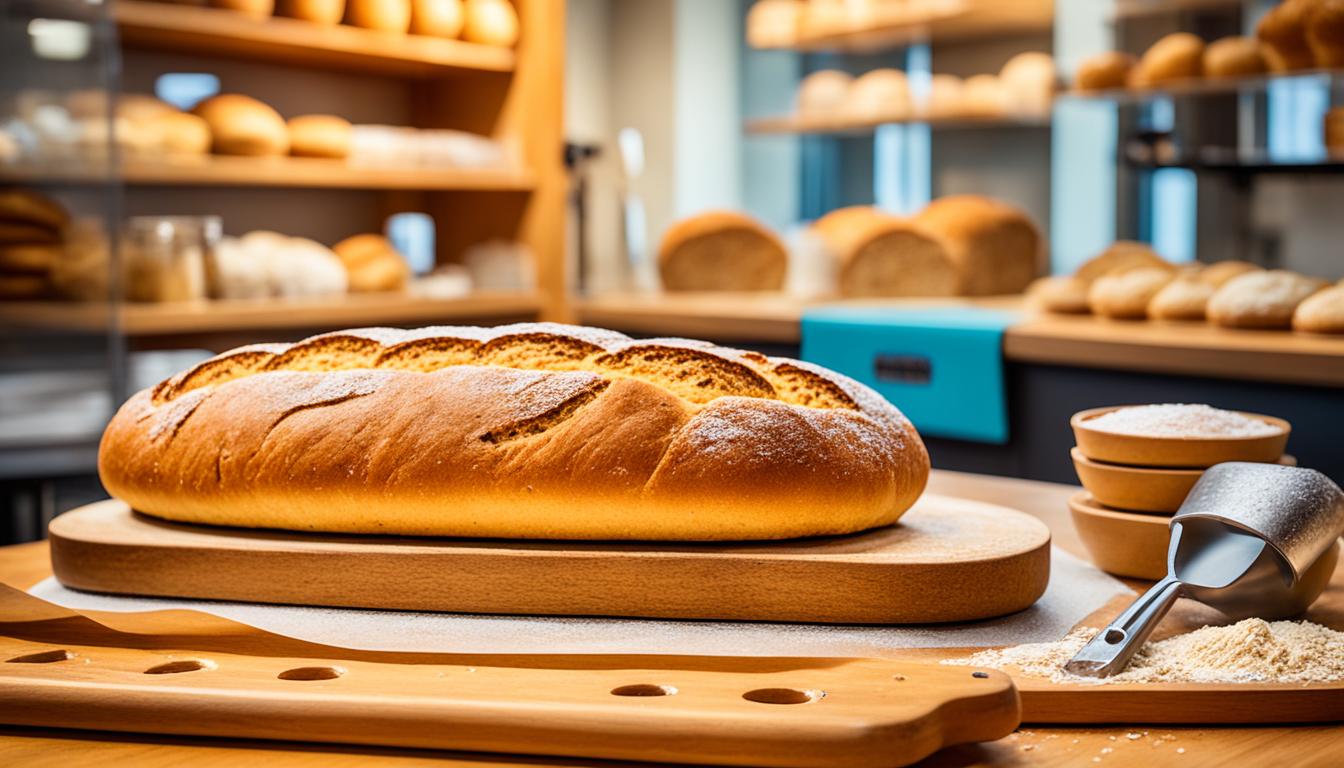Originally posted on March 26, 2024 @ 7:46 pm
When it comes to opening a bakery, many aspiring bakers believe that having their own recipes is a must. But is this really the case? Do you need to spend countless hours perfecting your own recipes before you can start selling your baked goods? Let’s break the common belief and explore the truth.
Contents
- 1 The Tradition of Sharing Recipes in the Bakery Industry
- 2 The Importance of Honesty in the Bakery Business
- 3 Reselling Baked Goods and Collaboration
- 4 Menu Planning and Recipe Adaptation
- 5 Dealing with Customer Expectations
- 6 Developing Your Own Flair and Signature Items
- 7 Emphasizing Strengths and Expertise
- 8 Conclusion
- 9 FAQ
- 9.1 Do I need my own recipes to open a bakery?
- 9.2 Is sharing recipes a common practice in the bakery industry?
- 9.3 How important is honesty in the bakery business?
- 9.4 Can I collaborate with other bakers or food suppliers to start a bakery?
- 9.5 How can I plan my bakery menu without my own recipes?
- 9.6 How should I manage customer expectations regarding my recipes?
- 9.7 Can I develop my own recipes even if I start with existing ones?
- 9.8 How can I emphasize my strengths and expertise in marketing my bakery?
- 9.9 Is it possible to start a bakery without my own recipes?
- 10 Source Links
Key Takeaways:
- You do not need to have your own recipes to start a bakery.
- Many successful bakeries use existing recipes from other sources.
- Honesty and transparency about the origin of your recipes are crucial.
- Collaborating with other bakers or food suppliers can expand your menu without the need for original recipes.
- Focus on creating high-quality and delicious baked goods to attract and satisfy customers.
The Tradition of Sharing Recipes in the Bakery Industry
One of the enduring traditions in the bakery industry is the sharing of recipes. Bakers have long collaborated and passed down recipes from one generation to the next, resulting in a rich tapestry of flavors and techniques. This tradition not only preserves the legacy of baking but also allows for creativity and innovation as bakers add their unique touches to existing recipes.
When starting a bakery, it is not necessary to have your own original recipes. You can source recipes from various places, including the vast resources available online or by networking with other bakers. Finding tried and tested recipes from experienced bakers can provide a solid foundation for your bakery. By adapting these recipes to suit your preferences and adding your own twist, you can create signature flavors that set your bakery apart.
“Sharing recipes in the bakery industry allows for a beautiful exchange of knowledge and expertise.”
This tradition of recipe sharing fosters a sense of community among bakers. It creates an environment where bakers can learn from one another and inspire new ideas. By collaborating and sharing recipes, bakers collectively raise the bar for the industry and push each other to continually improve.
In addition to traditional recipes, bakers can also explore bakery product development by incorporating new ingredients and techniques. Experimentation with flavors, textures, and presentation allows for the development of unique and exciting products that cater to changing customer preferences.
“By adapting existing recipes and exploring new ingredients, bakers can create exciting and innovative bakery products.”
While recipe sharing has its benefits, it is important to acknowledge and respect the original creators of recipes. Giving credit where it is due fosters a culture of honesty and integrity within the bakery industry. Over time, as your bakery establishes its identity and creates its own recipes, consider paying homage to the bakers who inspired your journey.
To showcase the impact of recipe sharing in the bakery industry, here’s a table highlighting some famous bakery recipes and the renowned bakers who popularized them:
| Recipe | Baker |
|---|---|
| Croissant | August Zang |
| Sourdough Bread | Chad Robertson |
| Red Velvet Cake | Waldorf Astoria Hotel |
The table above illustrates how iconic recipes have been shared and popularized over the years, contributing to the diverse culinary landscape of the bakery industry.
Harnessing the tradition of sharing recipes and embracing the spirit of collaboration can be transformative for your bakery. By incorporating the expertise and creativity of fellow bakers, you can create a menu that delights customers and sets your bakery apart.
The Importance of Honesty in the Bakery Business
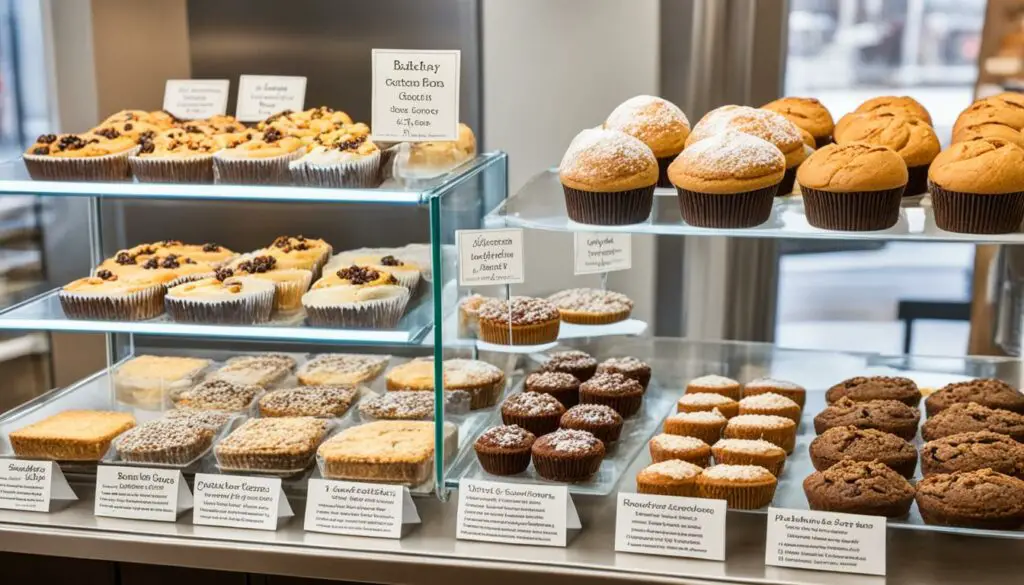
In the bakery business, honesty is key to building trust with your customers. It is essential to be transparent about the origin of your recipes, especially if you are using other people’s recipes. By giving proper credit to the original authors, you show respect for their work and maintain ethical standards.
Customers appreciate honesty and value businesses that are upfront about how they source their recipes. When opening a bakery without your own recipes, it is perfectly acceptable to use existing recipes. However, it is crucial to be honest about it and communicate this to your customers.
“Honesty and transparency create a strong foundation for any business, especially in the bakery industry. Customers appreciate businesses that are open and truthful about their practices. It builds trust and loyalty, fostering lasting relationships.”
Your customers will respect your honesty and understand that not every bakery needs to have its own original recipes. What truly matters is the quality and taste of your baked goods. As long as you prioritize creating delicious treats that satisfy your customers’ cravings, your bakery can thrive.
The Benefits of Honesty
Being honest about not having your own recipes can actually work in your favor. Here are a few benefits:
- Customer Trust: When customers know that you are honest about your recipe sourcing, they are more likely to trust your bakery and become repeat customers.
- Streamlined Operations: Using existing recipes can save you time and effort in recipe development, allowing you to focus on other aspects of running your bakery.
- Consistency: By using tried and tested recipes, you can ensure that your baked goods are consistently delicious, meeting your customers’ expectations every time.
Building Customer Relationships
When discussing your bakery’s recipes with customers, be open and transparent. Highlight the quality ingredients you use and the care you put into the baking process. Offer detailed information about the recipes you’ve chosen, emphasizing their popularity and positive customer feedback.
By building strong customer relationships based on trust and honesty, you can create a loyal customer base that appreciates the delicious treats you offer, regardless of whether they are original recipes or not.
| Benefits of Honesty in the Bakery Business |
|---|
| 1. Customer Trust |
| 2. Streamlined Operations |
| 3. Consistency |
Reselling Baked Goods and Collaboration
Starting a bakery without your own recipes? Not a problem! Another great option is to collaborate with other bakers or food suppliers. By reselling baked goods made by other people, you can build partnerships and offer a diverse range of products without the need to create your own recipes.
Collaborating with food suppliers not only allows you to expand your menu but also helps streamline your operations. Instead of spending time sourcing ingredients and perfecting recipes, you can focus on other essential aspects of running your bakery, such as marketing and customer service.
Benefits of Reselling Baked Goods
Reselling baked goods from reputable food suppliers offers several advantages:
- Wider Variety: Collaborating with other bakers or suppliers allows you to offer a wider selection of baked goods to cater to different tastes and preferences. From artisan bread to delectable pastries, diversifying your menu will attract a broader customer base.
- Quality Assurance: When partnering with established bakers or food suppliers, you can ensure consistent quality in the products you resell. Reputation and expertise play a crucial role in the success of any bakery business.
- Time-Saving: By reselling baked goods, you save valuable time that can be allocated to other critical business operations, such as inventory management, staff training, and marketing strategies.
- Cost Efficiency: Collaborating with bakers and suppliers allows you to share costs, such as equipment expenses, ingredient purchases, and marketing efforts. This can significantly reduce your initial investment and ongoing expenses.
Remember, when choosing which baked goods to resell, focus on aligning with the quality and values that your bakery represents. Select items that complement your existing offerings and cater to your target audience’s preferences.
Building Collaborative Partnerships
Forming collaborative partnerships with other bakers or food suppliers is key to the success of this approach. Here are some tips for establishing and maintaining these relationships:
- Research and Connect: Start by researching reputable bakers or food suppliers in your area. Attend industry events, connect through professional networks, or seek recommendations within the baking community.
- Build Trust: Nurture relationships based on trust and mutual respect. Maintain open communication, meet regularly to discuss business strategies, and uphold your commitments.
- Promote Each Other: Collaborate on marketing efforts to increase exposure for both your bakery and your partners’ products. Cross-promotions, joint social media campaigns, and showcasing their products in your bakery will help raise awareness and drive sales.
- Regular Collaboration: Continuously assess and adapt your partnership collaborations to meet changing customer demands. Offer feedback and suggestions to improve products and explore new opportunities together.
Collaborating with other bakers or food suppliers opens up a world of possibilities for your bakery. By reselling baked goods and building partnerships, you can create a diverse menu that delights customers while focusing on other essential aspects of running your business.
Ready to embark on this collaborative journey? Let’s explore menu planning and recipe adaptation in the next section to further enhance your bakery’s offerings.
Menu Planning and Recipe Adaptation
Menu planning is a crucial element of running a successful bakery. It allows you to offer a diverse range of baked goods that cater to different tastes and preferences. When it comes to creating your menu, consider sourcing recipes from various sources to provide a wide selection of delectable treats.
One way to source recipes is by exploring cookbooks filled with tried and tested recipes from renowned bakers and pastry chefs. These cookbooks can serve as a valuable resource for discovering new and exciting flavors that you can incorporate into your bakery’s menu. Experimentation is key when it comes to menu planning, so don’t be afraid to adapt recipes to suit your bakery’s theme and customer preferences.
“Menu planning allows you to offer a diverse range of baked goods that cater to different tastes and preferences.”
Browse online platforms dedicated to baking, as they offer a vast collection of recipes contributed by fellow bakers from around the world. These platforms provide an opportunity to explore different baking techniques, flavor combinations, and trendy dessert ideas that can add a unique touch to your menu.
Collaborating and networking with other bakers in the industry can also be a great way to source recipes. Discussions and knowledge sharing with fellow bakers can lead to exciting new flavor discoveries and innovative creations. Building relationships with other bakers can create a supportive community and open doors to a wealth of recipe sourcing opportunities.
“Collaborating and networking with other bakers can lead to exciting new flavor discoveries and innovative creations.”
Incorporating Your Own Twist
While sourcing recipes is essential for menu planning, don’t forget to add your own flair to the baked goods you offer. Experiment with different flavors, fillings, and toppings to create unique offerings that reflect your bakery’s style and expertise.
Consider incorporating signature items that customers can only find at your bakery. These could be inspired by family recipes, regional favorites, or even new creations that showcase your skills and creativity. Your signature items will help distinguish your bakery from others in the market and give customers a compelling reason to visit.
Providing High-Quality and Delicious Baked Goods
Regardless of where you source your recipes, the key to success lies in the quality and taste of your baked goods. Ensure that you prioritize using high-quality ingredients and maintain stringent quality control measures throughout your baking process.
Strive to create baked goods that are not only visually appealing but also consistently delicious. Experiment with flavor combinations, textures, and presentation to keep your menu innovative and enticing to customers.
Dealing with Customer Expectations
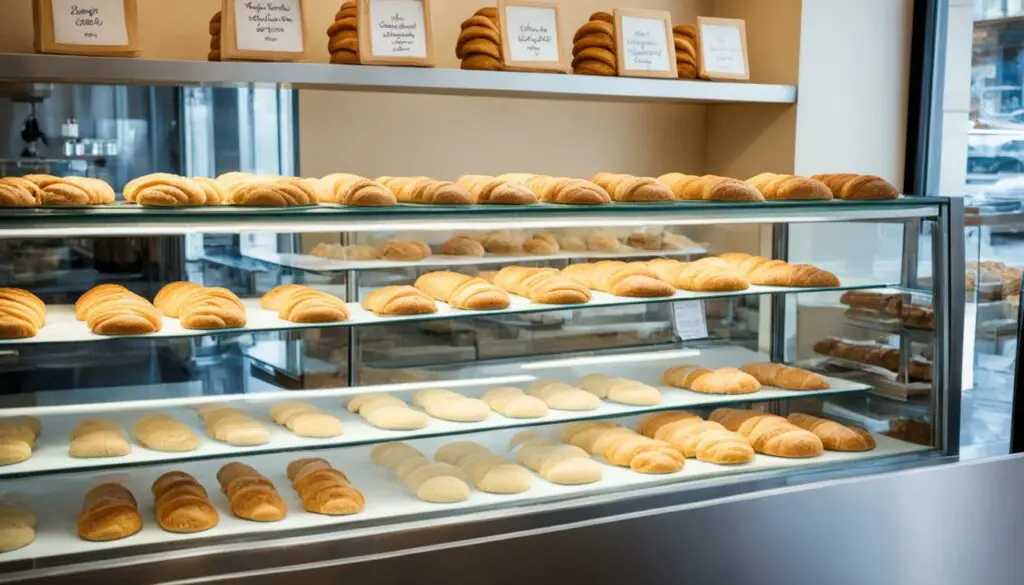
When it comes to your bakery’s recipes, managing customer expectations is crucial. While some customers may expect everything to be made from scratch, others may not have specific expectations. The key is to be honest with your customers about the origin of your recipes, while focusing on the quality and taste of your products.
“Customers appreciate honesty, and it’s important to build trust by providing accurate information about your ingredients and preparation methods.” – Sarah Johnson, owner of Sweets Delight Bakery
Remember that not all customers will be concerned about original recipes. What matters most is that your baked goods are delicious and meet their expectations. By emphasizing the taste and quality of your products, you can win over customers and keep them coming back for more.
Providing Transparency
Being transparent about your recipe sources is essential in the bakery business. Whether you are opening a bakery with existing recipes or without your own recipes, honesty will help you build a loyal customer base. Provide information about the recipes you use, such as acknowledging the original authors or sources.
Building Trust Through Quality
Beyond the origins of your recipes, focus on delivering high-quality products. Customers value taste, freshness, and consistency above all else. Make sure your baked goods are consistently good and live up to customer expectations.
Customer-Focused Communication
When customers inquire about your recipes, be prepared to discuss your baking processes, techniques, and the ingredients you use. Engage with them, answer their questions, and emphasize the efforts you put into ensuring the taste and quality of your products.
The Power of Word-of-Mouth
Positive customer experiences can lead to valuable word-of-mouth marketing. Encourage satisfied customers to share their experiences with friends and family, increasing awareness and trust in your bakery. Unique flavors and delightful treats will ultimately distinguish your offerings.
The Sweet Spot for Success
Starting a bakery without your own recipes or with existing ones is absolutely viable. It’s all about understanding and managing customer expectations, staying honest, and focusing on delivering delicious baked goods. Let the flavors and quality of your creations speak for themselves, and your bakery will thrive.
Developing Your Own Flair and Signature Items
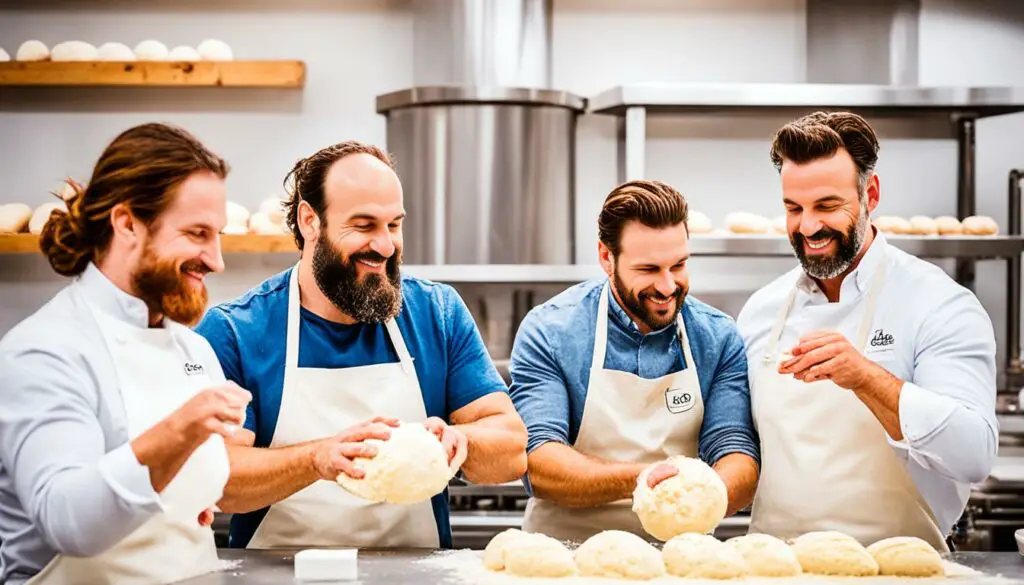
Even if you start with existing recipes, you can still bring your own unique touch to your bakery and create signature items that set you apart from the competition. Developing your own flair and style is essential for creating a memorable brand and enticing customers to choose your bakery.
Experiment with Flavors, Decorations, and Presentation
One way to develop your own flair is by experimenting with different flavors, decorations, and presentation styles. Add unexpected twists to traditional recipes by incorporating unusual ingredients or creating innovative flavor combinations. Play with textures, colors, and shapes to make your baked goods visually appealing and Instagram-worthy. Personalize your creations to align with the preferences and trends of your target market.
For example, if your bakery caters to health-conscious customers, consider offering gluten-free or vegan options. Experiment with alternative sweeteners or replace traditional ingredients with healthier substitutes without compromising on taste. By catering to specific dietary needs or preferences, you can attract a wider customer base and position your bakery as a go-to destination for specialized treats.
Tweak Existing Recipes and Develop Your Own
As you gain experience and confidence, don’t be afraid to tweak existing recipes or create your own from scratch. Test different ingredient proportions, baking times, or techniques to customize the taste and texture of your baked goods. Take feedback from customers and employees into consideration and use it to refine your recipes.
Developing your own signature items takes time, so be patient and persistent. Keep a record of your experiments, noting what worked and what didn’t, and use these learnings to refine your recipes and processes. Eventually, you may create unique recipes that become the highlight of your bakery’s menu.
Continuous Improvement and Innovation
In the dynamic world of baking, it’s important to stay updated with the latest trends and continuously innovate. Attend industry events, workshops, or trade shows to gain inspiration and insights from other bakers. Stay active on social media platforms to keep an eye on emerging trends and gather feedback from your online community.
Encourage your team to contribute ideas and suggestions for new flavors or products. Collaboration and brainstorming sessions can lead to exciting breakthroughs and help you discover new ways to stand out in the market.
Examples of Signature Items Developed by Bakeries
| Bakery | Signature Item |
|---|---|
| Sprinkles Cupcakes | Red Velvet Cupcake |
| Dominique Ansel Bakery | Cronut™ |
| Levain Bakery | Chocolate Chip Walnut Cookie |
| Magnolia Bakery | Banana Pudding |
These bakeries have become famous for their signature items, attracting customers from far and wide. By developing your own unique offerings, you can create a similar buzz and establish a loyal customer base.
Emphasizing Strengths and Expertise
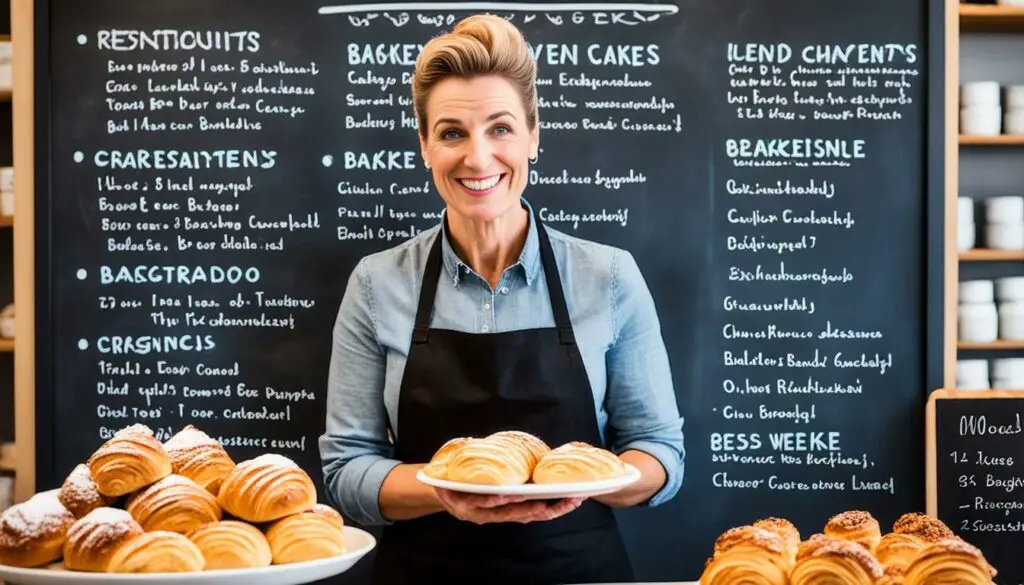
When it comes to marketing your bakery, it’s essential to highlight your unique strengths and expertise. By showcasing what sets your bakery apart, you can attract customers who appreciate your offerings. Here are some tips on how to emphasize your strengths:
- Use high-quality ingredients: Customers value freshness and quality in their baked goods. Highlight the fact that you use premium ingredients to create delicious treats that stand out.
- Offer a wide variety of flavors: Variety is the spice of life, and when it comes to bakery products, customers love having options. Showcase the diverse range of flavors you offer, from classic favorites to unique and innovative creations.
- Create custom-designed cakes: Special occasions call for special cakes. If your bakery offers custom-designed cakes, make sure to emphasize this unique service. Let customers know that you can bring their visions to life with beautifully crafted and personalized cakes.
“Using the finest ingredients and offering a wide variety of flavors allows us to create bakery products that exceed customer expectations.”
When communicating with your customers, provide clear and accurate information about your products. Specify the ingredients used, highlight any special techniques or processes, and share the expertise behind your creations. This transparency will build trust and credibility with your target audience.
By emphasizing your strengths and expertise, you can differentiate your bakery from the competition and attract customers who value quality, variety, and personalized service. Let your passion and skills shine through in every baked good you create!
Bakery Startup Tips
| Tip | Description |
|---|---|
| 1 | Identify your target audience and tailor your menu to their preferences. |
| 2 | Invest in high-quality baking equipment and tools. |
| 3 | Develop a strong brand identity and showcase it through your bakery’s aesthetics. |
| 4 | Build relationships with local suppliers to ensure a steady and fresh supply of ingredients. |
| 5 | Implement effective marketing strategies, both online and offline, to reach your target audience. |
| 6 | Continuously innovate and experiment with new flavors and products to keep customers engaged. |
By following these bakery startup tips and emphasizing your strengths, you can set your bakery up for success. Remember, menu planning and showcasing your expertise are crucial in attracting and retaining customers!
Conclusion
Starting a bakery without your own recipes is entirely possible and can lead to a successful business. Contrary to popular belief, you don’t need to be a culinary innovator to create delicious baked goods that customers will love. By using other people’s recipes and adapting them to suit your bakery’s needs, you can provide high-quality treats that satisfy the taste buds of your customers.
Honesty is paramount when it comes to sourcing recipes. Be transparent with your customers about the origin of your recipes and give credit to the original authors. Building trust with your customers will ensure that they appreciate your dedication to providing them with tasty baked goods, even if they aren’t completely original.
Menu planning, managing customer expectations, and developing your own unique flair are all important considerations when starting a bakery without your own recipes. By continuously refining your menu, focusing on quality, and adding your own creative twists, you can create a bakery that stands out from the crowd. Remember to emphasize your expertise and strengths when marketing your bakery, and be proud of the high-quality products you offer.
In conclusion, starting a bakery without your own recipes is a viable option. With the right strategies, dedication, and a focus on delivering delicious baked goods, you can create a successful bakery business that satisfies your customers’ cravings without the need for your own recipes. So don’t let the lack of original recipes hold you back from pursuing your dream of owning a bakery. Get started on your baking journey and delight your customers with a wide range of delectable treats!
FAQ
Do I need my own recipes to open a bakery?
No, it is not necessary to have your own recipes to start a bakery. You can use other people’s recipes and adapt them to suit your bakery’s needs.
Is sharing recipes a common practice in the bakery industry?
Yes, bakers often share recipes and add their own unique touches to create their own signature flavors.
How important is honesty in the bakery business?
Honesty is crucial in the bakery business. It is important to be transparent with your customers about the origin of your recipes and give proper credit to the original author if you are using other people’s recipes.
Can I collaborate with other bakers or food suppliers to start a bakery?
Yes, collaborating with other bakers or food suppliers can help you offer a wider variety of products without the need to create your own recipes.
You can source recipes from various sources such as cookbooks, online platforms, and other bakers, and adapt them to suit your bakery’s theme and customer preferences.
How should I manage customer expectations regarding my recipes?
Be honest with your customers about the origin of your recipes and focus on the quality and taste of your products. Provide information about your ingredients and preparation methods to build trust with your customers.
Can I develop my own recipes even if I start with existing ones?
Yes, over time you can develop your own flair and create signature items that set your bakery apart. Experiment with different flavors, decorations, and presentation styles to add your own unique touch to the baked goods.
How can I emphasize my strengths and expertise in marketing my bakery?
Highlight the aspects that make your bakery unique and special, such as using high-quality ingredients, offering a wide variety of flavors, or creating custom-designed cakes. Communicate your expertise and be proud of your offerings.
Is it possible to start a bakery without my own recipes?
Yes, having your own recipes is not a must to start a bakery. With the right strategies and dedication, you can create a successful bakery business without the need for your own recipes.

